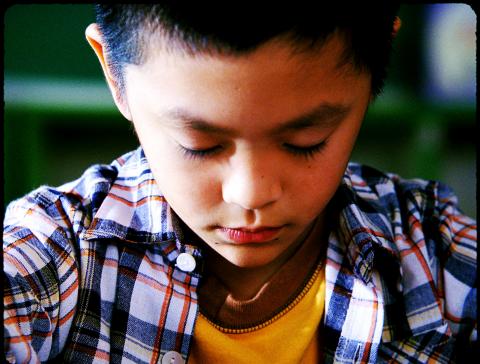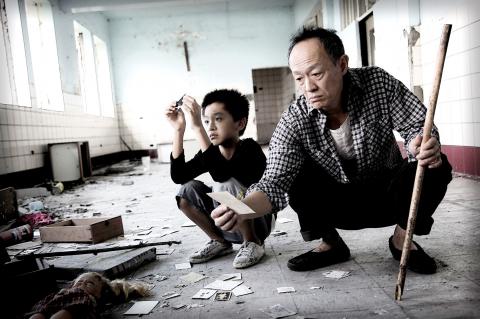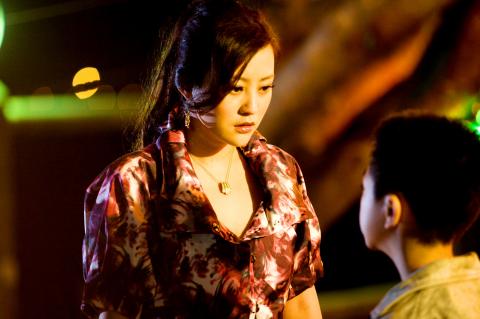After his critically acclaimed feature debut Parking (停車, 2008), a darkly comic urban drama, director Chung Mong-hong (鍾孟宏) moves to the countryside in the exquisitely crafted The Fourth Portrait (第四張畫). The atmospheric film takes a poignant look at the issue of domestic violence through the tale of a boy haunted by loss, and is enhanced by handsome cinematography and a top-notch cast that includes Taiwanese thespians Leon Dai (戴立忍) and King Shih-chieh (金士傑), as well as Hao Lei (郝蕾) from China.
Set in rural Taiwan, the film opens with 10-year-old Xiang, effortlessly played by newcomer Bi Xiao-hai (畢曉海), watching his father pass away in a hospital room. Left alone in the world, the boy manages to survive by stealing boxed meals. An elderly school janitor (played by King) takes Xiang under his wing.
Later Xiang’s estranged mother (played by Hao), remarried to a morose night market vendor (played by Dai), comes to take the boy to his new family. A sense of foreboding envelopes the movie when the train that the mother and son take speeds into a black tunnel, leaving the two devoured by darkness.

PHOTO COURTESY OF ATOM CINEMA
Xiang’s new home is cold and unwelcoming; the stepfather is rancorous and distant. His mother, a Chinese immigrant, seems exhausted by her life as a hostess at a ramshackle karaoke bar. The boy struggles to make sense of his hostile environment by sketching portraits, and finds solace in a newly found friendship with a portly outcast, played by entertainer Lin Yu-chih (林郁智), better known as Na Dou (納豆). The friend makes Xiang an accomplice to his petty crimes.
The story takes a menacing turn when Xiang draws a portrait inspired by a dream about his older brother, who disappeared some years earlier. A series of macabre incidents ensues, gradually laying bare a skeleton in the family closet.
Cowritten, shot and directed by Chung, the film shares a similar episodic approach to storytelling with Parking. The child protagonist’s series of encounters with odd characters offers gripping moments, but prevents the viewer from emotionally investing in the narrative. The distancing effect that works well in Parking to convey urban estrangement is often frustrating when one tries to grasp the emotional poignancy and depth suggested in The Fourth Portrait.

PHOTO COURTESY OF ATOM CINEMA
Nonetheless, Chung is a wizard at evoking moods. The director never shuns away from his background in TV commercials, weaving rich colors, polished compositions and fluid camera work into a cinematography that gives Taiwan’s countryside a dreamlike, surreal quality.
The bleak, hostile environment is inhabited not only by petty criminals and drifters but ominous dark clouds rolling in from a distance and toxic yellow fumes belching out of factories in the background. Most striking of all is the stepfather’s giant fish tank, which exudes an eerie blue light that doesn’t seem to be of this world.
The solid cast lends considerable strength and grace to the work. Hao, almost unrecognizable from her lauded big-screen debut in Lou Ye’s (婁燁) Summer Palace (頤和園, 2006), presents a powerful character study of a Chinese immigrant who comes to Taiwan in search of a better life but ends up disillusioned. Dai is stunningly fierce as the stepfather. Rather than a character grounded in real life, however, Dai’s role feels more like an embodiment of wickedness that seems out of synch with the other rural inhabitants.

PHOTO COURTESY OF ATOM CINEMA
Since his award-winning documentary Doctor (醫生) in 2006, Chung has honed a distinct style and unique sensibility. Given more time to refine his skills in storytelling and character development, the seasoned commercial filmmaker will no doubt grow into much more than a cinematic stylist.

Towering high above Taiwan’s capital city at 508 meters, Taipei 101 dominates the skyline. The earthquake-proof skyscraper of steel and glass has captured the imagination of professional rock climber Alex Honnold for more than a decade. Tomorrow morning, he will climb it in his signature free solo style — without ropes or protective equipment. And Netflix will broadcast it — live. The event’s announcement has drawn both excitement and trepidation, as well as some concerns over the ethical implications of attempting such a high-risk endeavor on live broadcast. Many have questioned Honnold’s desire to continues his free-solo climbs now that he’s a

As Taiwan’s second most populous city, Taichung looms large in the electoral map. Taiwanese political commentators describe it — along with neighboring Changhua County — as Taiwan’s “swing states” (搖擺州), which is a curious direct borrowing from American election terminology. In the early post-Martial Law era, Taichung was referred to as a “desert of democracy” because while the Democratic Progressive Party (DPP) was winning elections in the north and south, Taichung remained staunchly loyal to the Chinese Nationalist Party (KMT). That changed over time, but in both Changhua and Taichung, the DPP still suffers from a “one-term curse,” with the

Jan. 26 to Feb. 1 Nearly 90 years after it was last recorded, the Basay language was taught in a classroom for the first time in September last year. Over the following three months, students learned its sounds along with the customs and folktales of the Ketagalan people, who once spoke it across northern Taiwan. Although each Ketagalan settlement had its own language, Basay functioned as a common trade language. By the late 19th century, it had largely fallen out of daily use as speakers shifted to Hoklo (commonly known as Taiwanese), surviving only in fragments remembered by the elderly. In

Lines between cop and criminal get murky in Joe Carnahan’s The Rip, a crime thriller set across one foggy Miami night, starring Matt Damon and Ben Affleck. Damon and Affleck, of course, are so closely associated with Boston — most recently they produced the 2024 heist movie The Instigators there — that a detour to South Florida puts them, a little awkwardly, in an entirely different movie landscape. This is Miami Vice territory or Elmore Leonard Land, not Southie or The Town. In The Rip, they play Miami narcotics officers who come upon a cartel stash house that Lt. Dane Dumars (Damon)